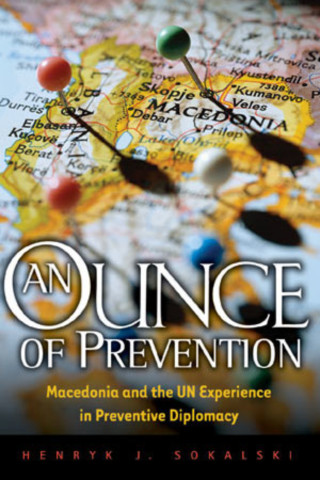An Ounce of Prevention
"The science of medicine was the first to discover that 'an ounce of prevention is worth a pound of cure,'" Henryk Sokalski reminds us as he begins this study of a unique United Nations mission. "In the political realm, however, its full potential has yet to be realized." Sokalski, former head of the United Nations Preventive Deployment Force (UNPREDEP) in the former Yugoslav republic of Macedonia, provides the ultimate insider's look at the UN's attempt to establish a mission in this former Yugoslav republic before the imminent eruption of mass violence spilling over from neighboring Balkan states—Serbia and its overwhelmingly ethnic Albanian province of Kosovo in particular.
An Ounce of Prevention—and the UNPREDEP mission itself—begins in early 1995 with a telephone call to Sokalski at his Warsaw home from UN Secretary General Boutros-Ghali, and it ends several years later in a disappointing Security Council veto of the mission's renewal. In between, Sokalski's study of this "novel experiment in UN peacekeeping" describes the mission's three "pillars" as well as contending theories on preventive diplomacy and early preventive action, contemporary Balkan history, and the daily bureaucratic and human challenges of reinventing civil society. All the while, Sokalski attempts to answer the question of whether the mission's renewed mandate could have prevented the country's recent destructive insurgency—and whether UNPREDEP's truncated success could serve as a model for future UN preventive deployments.
By presenting the exclusive story about the first UN preventive deployment, Henryk Sokalski demonstrates that there are alternatives for the timely management of peace and security. The UN mission in the Republic of Macedonia was such an alternative. It was a clear signal to everybody in the country and to the neighboring countries that the international community is interested in the peaceful development of the newly independent state.
Kiro Gligorov, former president of the Republic of Macedonia
An Ounce of Prevention will be a guide for understanding the role of the UN in preserving peace and security in the world.
Sokalski provides a first-hand account of the UN's novel approach to peacekeeping in Macedonia—preventive deployment—and how it contributed to the only peaceful secession from the former Yugoslavia.
Michael Lund, author of Preventing Violent Conflicts
In an era when peacekeeping missions may find themselves handling more complex and destructive conflicts, this insider's story provides illuminating lessons about a less costly and less troubled alternative.
By presenting the exclusive story about the first UN preventive deployment, Henryk Sokalski demonstrates that there are alternatives for the timely management of peace and security. The UN mission in the Republic of Macedonia was such an alternative. It was a clear signal to everybody in the country and to the neighboring countries that the international community is interested in the peaceful development of the newly independent state. An Ounce of Prevention will be a guide for understanding the role of the UN in preserving peace and security in the world.
Kiro Gligorov, former president of the Republic of Macedonia
Sokalski provides a first-hand account of the UN's novel approach to peacekeeping in Macedonia—preventive deployment—and how it contributed to the only peaceful secession from the former Yugoslavia. In an era when peacekeeping missions may find themselves handling more complex and destructive conflicts, this insider's story provides illuminating lessons about a less costly and less troubled alternative.
Michael Lund, author of Preventing Violent Conflicts
Henryk J. Sokalski
Henryk J. Sokalski has more than twenty-five years of experience in the Polish foreign service and thirteen years at the United Nations, where his last position was as assistant secretary general. From 1995 to 1998, as a special representative of the UN secretary general, Sokalski led the UN Preventive Deployment Force in Macedonia. He was a senior fellow at the U.S. Institute of Peace during 2000–2001.

